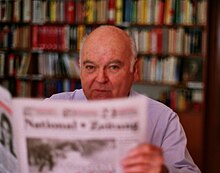Gerhard Frey (politician)
show This article may be expanded with text translated from the corresponding article in German. (June 2018) Click [show] for important translation instructions. |
Gerhard Frey | |
|---|---|
 Frey in 2009 | |
| Born | Gerhard Michael Frey 18 February 1933 |
| Died | 19 February 2013 (aged 80) Gräfelfing, Germany |
| Occupation | Business, Publishing |
| Spouse(s) | Regine Frey |
| Children | 4 children |
Gerhard Michael Frey (18 February 1933 – 19 February 2013)[2] was a German publisher, businessman and politician. He was the chairman and main financial backer of the right-wing party Deutsche Volksunion, which he founded in 1971. He resigned as chairman in January 2009.[3]
Biography[]
Gerhard Frey was born on 18 February 1933 in Cham. He studied law.[4] In 1960 Frey received his PhD (Dr. rer. pol.) from the University of Graz, Austria. His dissertation was a study of the trade pattern between Austria and Germany.[5] He was married to Regine Frey, with whom he had four children.[3][6] His daughter Michaela (born 1965) is an attorney, his son Gerhard Jr. (born 1969) is a lawyer. Frey died on 19 February 2013, the day after his 80th birthday, in Gräfelfing near Munich.[7]
The scholar Cas Mudde described Frey as "One of the most influential people in the German post-war extreme right scene" and a "multi-millionaire media czar who owns and publishes several newspapers".[8]
Frey took control of the far right Deutschen Soldaten-Zeitung in 1959, later renamed National Zeitung, and raised the paper’s circulation from 27,500 in 1958 to 131,000 in 1967. The paper frequently published historical revisionist and anti-Israel articles.[9][10] In 1967 it used the term desk murderer (Schreibtischtäter) referring to people who support Israel as, in its view, they thereby take the risk to become accomplices in crimes committed there.[11]
Frey has been described as rarely generous, except at his party functions where he hosted David Irving, whom he paid generously and provided a hired luxury car for.[12] A large amount of advertising in National Zeitung were for Frey's other businesses, thus more money than usual went back to Frey. Such businesses included Deutsche Reisen, a travel service, and the Deutsche Buchdienst, selling books, medals and flags.[13] Frey's party, the DVU, was described as the "Frey-Party" because of its financial dependency on him.[14] The Irish Times, after the party's success in the 1998 Saxony-Anhalt state elections, described the DVU as "less a political party than the dangerous plaything of a millionaire", without any real party structure. At the time, Frey's personal fortune was estimated to be in excess of DM 500 million.[1]
Frey enjoyed good relations with some conservative politicians like Alfred Seidl,[15] interior minister of Bavaria 1977-78, with European far-right and right wing leaders like Jean-Marie Le Pen and Vladimir Zhirinovsky but his relationship with other German far-right leaders was less friendly as they feared his financial power could overwhelm them.[16]
References[]
- ^ Jump up to: a b "Far-right party little more than one wealthy fanatic's toy". The Irish Times. 28 April 1998. Retrieved 28 November 2018.
- ^ "DVU-Gründer Gerhard Frey gestorben" [DVU founder Gerhard Frey passed away]. Abendzeitung (in German). 23 February 2013. Retrieved 30 November 2018.
- ^ Jump up to: a b ""Frey-Partei" ohne Frey / Der DVU-Vorsitzende ist abgetreten". Frankfurter Allgemeine Zeitung, 13 January 2009, page 6.
- ^ "Munzinger-Archiv, Artikel Gerhard Frey". Munzinger.de. Retrieved 1 January 2019.
- ^ Gerhard Frey: Die Handelsverflechtung Österreichs mit Deutschland. Dissertation in Political and Economic Sciences. Graz, 1960.
- ^ "Ehepaar Frey spendete DVU mehr als eine Million Mark". Frankfurter Allgemeine Zeitung, 31 March 1994, page 2.
- ^ tm/rc (AP, AFP, dpa) (23 February 2013). "Far-right financier Gerhard Frey dies". DW. Retrieved 24 February 2013.CS1 maint: multiple names: authors list (link)
- ^ Cas Mudde (2002). The Ideology of the Extreme Right. Manchester University Press. p. 60. ISBN 978-0-7190-6446-3.
- ^ "Deutsche National Zeitung". Der Spiegel (in German). 13 March 1963. Retrieved 17 November 2018.
- ^ Strothmann, Dietrich (8 September 1967). "Angeklagt: die National-Zeitung" [Charged: The National Zeitung]. Die Zeit (in German). Retrieved 17 November 2018.
- ^ "Hohlspiegel" [Concave Mirror]. Der Spiegel (in German). 10 July 1967. Retrieved 1 January 2019.
- ^ ""Seine Raffgier ist umfassend"" [His greed is all encompassing]. Der Spiegel (in German). 29 May 1989. Retrieved 18 November 2018.
- ^ Mudde 2002, p. 66.
- ^ ""Frey-Partei" ohne Frey" ["Frey Party" without Frey]. Frankfurter Allgemeine (in German). 12 January 2009. Retrieved 27 November 2018.
- ^ "Munzinger-Archiv, Artikel Alfred Seidl". Munzinger.de. Retrieved 1 January 2019.
- ^ Atkins 2004, p. 100.
Bibliography[]
- Atkins, Stephen E. (2004). "The Togliatti amnesty". Encyclopedia of Modern Worldwide Extremists and Extremist Groups. Greenwood Publishing Group. p. 100. ISBN 978-0313324857.
gerhard frey dvu.
- Mudde, Cas (2002). The Ideology of the Extreme Right. Manchester University Press. ISBN 978-0-7190-6446-3.
External links[]
| Wikimedia Commons has media related to Gerhard Frey. |
- (in German) Official Site of the National Zeitung
- 1933 births
- 2013 deaths
- People from Cham, Germany
- German People's Union politicians
- National Democratic Party of Germany politicians
- Leaders of political parties in Germany
- German nationalists
- 20th-century German newspaper publishers (people)
